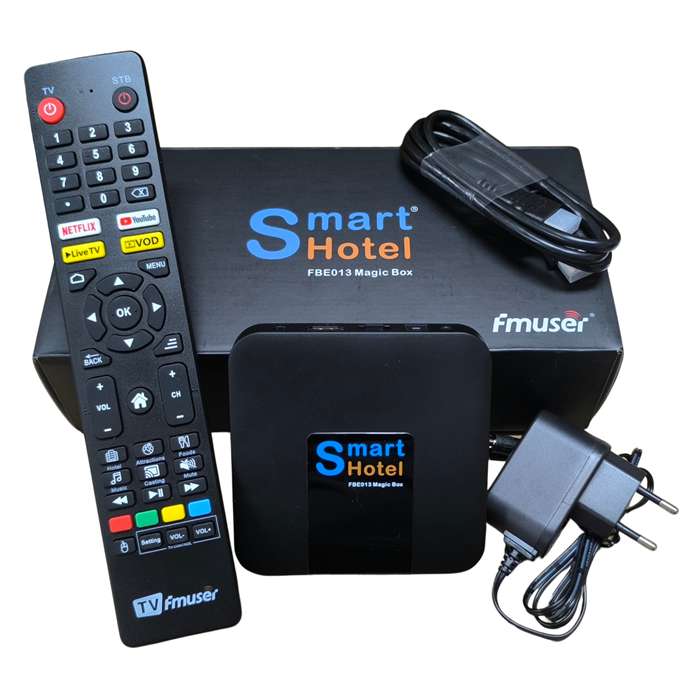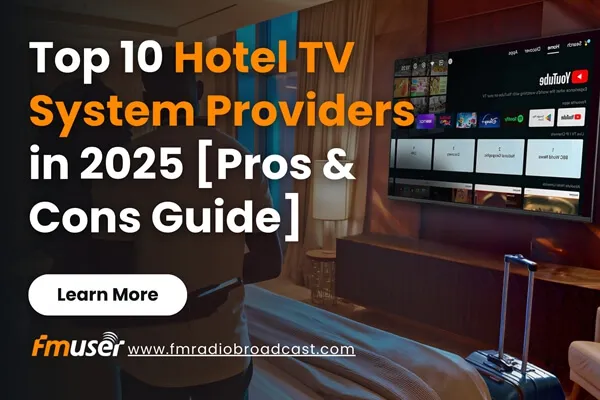
Hot tag
Popular search
Top 10 Hotel TV System Providers in 2025: Pros, Cons & Future-Proof Picks
1. Introduction: Why Modern Hotel TV Systems Are Non-Negotiable in 2025
Imagine a guest walking into their hotel room in 2025, only to find a TV system that can’t stream their favorite shows, adjust room lighting, or even support their language preferences. Within minutes, they’re tweeting about the "outdated experience"—and your hotel’s reputation takes a hit.
👇👇 New Arrival! 👇👇
FMUSER FBE013 Magic IPTV STB Kit with RC
|
FMUSER FBE013 IPTV Smart Hotel Magic Box Kit with RC! Click here for details.
|
 |
This isn’t a hypothetical scenario. A recent study predicts that 72% of travelers will prioritize hotels with tech-smart rooms by 2025, and properties clinging to outdated TV systems risk losing bookings to competitors investing in modern solutions.
1) The Cost of Falling Behind
Legacy cable TV systems aren’t just frustrating guests—they’re draining budgets. Outdated setups force hotels into expensive hardware repairs, limit revenue from premium content bundles, and deter tech-savvy travelers. Worse, they lack the agility to support today’s must-have smart room features, like voice-controlled thermostats or personalized streaming profiles.
2) 2025’s Urgency Drivers
Three trends are forcing hotels to act now:
- IoT Integration: Guests expect rooms where TVs sync with lighting, climate, and voice assistants. Systems without IoT readiness can’t deliver these seamless experiences.
- Hybrid IPTV/Cable Solutions: Not every hotel can overhaul decades-old coaxial wiring overnight. Hybrid systems bridge legacy infrastructure with modern IPTV features, allowing phased upgrades without costly rewiring.
- Customization and Ownership Model Pressures: Guests demand hyper-personalized content (e.g., language-specific interfaces, tailored streaming profiles), while hotels face tightening budgets. Proprietary systems with rigid licensing or SaaS traps restrict customization and inflate long-term costs. Owners now prioritize adaptable providers like FMUSER, offering one-time ownership and open APIs to avoid vendor lock-in and endless fees.
3) What This Guide Offers
For engineers, procurement teams, and IT consultants, choosing the right TV system isn’t about chasing the shiniest tech—it’s about balancing:
- Technical Flexibility: Can it retrofit existing setups? Scale to 500+ rooms without crashing?
- Budget Realities: Are licensing fees transparent, or will hidden costs bite later?
- Future-Proofing: Does it offer APIs for IoT partners?
We’ve evaluated 2025’s top providers through this lens—and the rankings might surprise you. Spoiler: A hybrid IPTV-cable dark horse outperforms pure-cloud players, while some "budget-friendly" vendors hide fees that could derail your project.
Stay tuned for actionable insights to avoid overspending, vendor lock-in, and systems that become obsolete by 2026. Let’s dive in.
Contact Now, We're Here to Help!
2. Cable TV Systems: A Legacy Hanging by a Thread
Traditional cable relies on coaxial wiring to deliver channels. While familiar, it’s becoming a relic in the IP era. Cable is like a flip phone in a smartphone world. It “works” for hotels clinging to legacy systems but fails to meet modern guest expectations.
| Pros | Cons |
|---|---|
|
|
Cable is like a flip phone in a smartphone world. It “works” for hotels clinging to legacy systems but fails to meet modern guest expectations.
Contact Now, We're Here to Help!
3. IPTV Systems: The Smart Choice (But Not All IPTV Is Equal)
IPTV (Internet Protocol TV) streams content over networks, enabling interactive features. However, there are two models—cloud-based and LAN-based—each with trade-offs:
1) Cloud-Based IPTV
Cloud-Based IPTV operates by hosting content on remote servers, which is then streamed to users via the internet. This approach is particularly advantageous for small hotels that have a stable, high-speed internet connection and do not foresee any immediate plans for Internet of Things (IoT) expansion.
| Pros | Cons |
|---|---|
|
|
2) LAN-Based IPTV
LAN-Based IPTV operates by storing content on local servers that are integrated within a hotel’s network. This system allows for efficient streaming and management of video content, catering specifically to the needs of larger hotels, chains, or properties that prioritize long-term return on investment (ROI) and greater control over their media offerings.
| Pros | Cons |
|---|---|
|
|
You May Also Like:
- Hotel TV Upgrade Challenges: 5 IPTV Solutions to Save Costs & Boost Guest Experience
- No More Buffering: Low-Cost TV-over-IP Systems Every Modern Hotel Needs
- Ownership Model IPTV: Why Luxury Resorts Choose LAN Over Cloud
- IPTV Subscription vs. Ownership: Which Saves Resorts More?
Contact Now, We're Here to Help!
3) Pricing Models: The Fine Print That Sinks Budgets
Cloud and LAN IPTV providers use vastly different pricing strategies:
- Cloud Trap: “Affordable” €5/room/month plans often exclude add-ons like 4K streaming or multilingual support, which can double costs.
- LAN Advantage: FMUSER’s one-time ownership model means you pay once for hardware and software (e.g., €20,000 for 200 rooms), saving €10,000+ over 5 years compared to cloud subscriptions.
While cloud IPTV tempts with low upfront costs, LAN-based systems like FMUSER’s offer long-term savings and adaptability. For hotels ready to ditch cable but wary of cloud risks, hybrid LAN/cloud solutions bridge the gap—letting you phase upgrades while retaining control.
Key Questions to Ask Providers:
- “Are firmware updates included, or will they charge extra later?”
- “Does your system support retrofitting our existing cable infrastructure?”
- “Can we integrate third-party IoT devices without your approval?”
Next Up: We decode 2025’s top providers, exposing who delivers true value and who hides dealbreakers behind flashy sales pitches.
Contact Now, We're Here to Help!
4. Top 10 Hotel TV System Providers in 2025
1) FMUSER
FMUSER is a globally recognized leader in hotel IPTV systems, specializing in one-time ownership models that prioritize technical flexibility, cost transparency, and future-proof innovation. With over 15 years of experience, we empower hotels of all sizes—from boutique inns to sprawling resorts—to upgrade aging cable systems or deploy cutting-edge IPTV networks without vendor lock-in or hidden fees.
1) Solutions Provided
- Retrofitting Solutions: Upgrade legacy cable systems without rewiring costs.
- LAN-Based IPTV: Full offline functionality and guest data security with local servers.
- Cloud-Ready Scalability: Centralized management for multi-property chains.
- API-First Architecture: Integrate third-party IoT devices (smart lighting, thermostats, etc.).
2) Why Choose FMUSER Over Others?
- One-Time Cost: Avoid endless SaaS/subscriptions (vs. Samsung/LG/Hibox).
- Full Ownership: No vendor lock-in or forced upgrades.
- Hybrid Flexibility: Retrofits cable and IPTV (vs. HAOXUN/ZAFIRO’s rigid setups).
- Offline Reliability: LAN servers eliminate buffering risks (vs. CloudStream’s internet dependency).
- Open APIs: Integrate any IoT device
- Global Support: Direct FMUSER-certified technicians
- Zero Hidden Fees: All licenses and updates included upfront.
- Military Security: GDPR/CCPA-compliant encryption protects guest data.
3) FAQs: Addressing System Integrators’ Top Concerns
Q1: How does FMUSER handle integration with legacy cable systems?
A: FMUSER’s hybrid-ready hardware converts existing coaxial infrastructure to IPTV with minimal rewiring. The Quad-Play Gateway supports simultaneous RF and IPTV signals, enabling seamless phased upgrades while preserving existing infrastructure—ideal for historic buildings or hotels on a budget.
Q2: Can FMUSER’s system scale across multiple hotel properties?
A: Yes. FMUSER combines LAN-based reliability with cloud-enabled scalability, allowing centralized management for properties ranging from 1 to 10,000+ rooms. The system grows with your needs, avoiding latency or performance bottlenecks.
Q3: Are there recurring fees for software updates or licenses?
A: No. FMUSER’s one-time ownership model includes lifetime firmware updates and full software licenses. There are no hidden costs for upgrades, premium features, or API access—ever.
Q4: What happens if we need onsite support in remote regions?
A: FMUSER maintains a global network of 200+ pre-certified technicians in 60+ countries. Most onsite issues are resolved within 24 hours, with no surprise fees for emergency support or labor.
Q5: How customizable is the guest interface for branding/IoT?
A: FMUSER’s open API platform allows full UI/UX customization, including white-label branding and integration with third-party IoT devices (e.g., smart thermostats, lighting). No restrictions or proprietary barriers.
Q6: Does FMUSER comply with energy efficiency/sustainability standards?
A: Yes. FMUSER hardware is Energy Star-certified, consuming 35% less power than industry averages. Our hybrid solutions also reduce e-waste by reusing existing infrastructure instead of requiring full replacements.
Q7: How secure is guest data compared to other providers?
A: FMUSER uses military-grade AES-256 encryption, with all guest data stored on local LAN servers—never on third-party clouds. This ensures compliance with GDPR, CCPA, and other global privacy standards.
Contact Now, We're Here to Help!
2) Samsung
A global leader in consumer electronics, Samsung extends its prowess to hospitality with cutting-edge TV systems designed for luxury hotels. Their 2025 lineup features 8K QLED displays, AI-driven content curation, and seamless integration with Samsung’s proprietary IoT ecosystem (e.g., smart mirrors, voice-controlled rooms). Targeting high-end resorts and tech-forward chains, Samsung emphasizes brand prestige but requires significant upfront investment.
| Pros | Cons |
|---|---|
|
❌ High Upfront Costs: Hardware prices start at €800/room (excludes installation). ❌ Proprietary Ecosystem: Locks hotels into Samsung-only IoT devices, raising long-term upgrade costs. ❌ Cloud-Dependent Features: Advanced AI tools require annual subscriptions (€15/room/year).
|
Contact Now, We're Here to Help!
3) LG Hospitality TV Solutions
LG brings its consumer electronics expertise to the hospitality sector with advanced OLED TV systems tailored for modern hotels. Their 2025 models emphasize sleek design, webOS Smart TV platforms, and IoT integrations with LG-branded smart devices (e.g., air purifiers, smart blinds). Targeting upscale and mid-range hotels, LG positions itself as a bridge between luxury aesthetics and interactive guest experiences.
| Pros | Cons |
|---|---|
|
|
Contact Now, We're Here to Help!
4) Hibox
Hibox, a Finland-based subsidiary of Accedo, delivers cloud-driven IPTV solutions for global hotel chains. Their platform focuses on pre-built entertainment interfaces and centralized content management but relies on third-party partners for implementation, limiting customization and control.
| Pros | Cons |
|---|---|
|
❌ Subscription Lock-In:
❌ Hidden Partner Costs:
❌ Limited Custom APIs: Pre-built templates restrict IoT integrations (e.g., smart room controls). ❌ Unresponsive Support: No dedicated account managers; ticket resolution averages 72+ hours. |
Contact Now, We're Here to Help!
5) ZAFIRO
Founded in 2010 and rebuilt on AWS cloud architecture in 2021, ZAFIRO provides a fully cloud-based digital ecosystem for hotels, integrating IPTV, casting, WiFi, and digital signage. The company emphasizes transparency (reflected in open-plan workspaces), environmental sustainability via AWS’s energy-efficient infrastructure, and adherence to UN Global Compact principles. Their solutions target modern hotels prioritizing remote management and unified guest experiences but rely heavily on stable internet and subscription models.
| Pros | Cons |
|---|---|
|
|
Contact Now, We're Here to Help!
6) Nevron
Nevron, a Slovenia-based IPTV provider, offers converged infotainment systems for hotels, healthcare, and maritime sectors. With 20+ years in the industry, their platform emphasizes simplified deployment and standardized integrations. While positioned as reliable for large-scale deployments, their cloud-based model limits onsite control.
| Pros | Cons |
|---|---|
|
❌ Subscription Dependency:
❌ Hidden Maintenance Fees:
❌ No Hybrid Flexibility: Purely cloud-driven—no LAN/offline fallback. |
Contact Now, We're Here to Help!
7) FMUSER
FMUSER is a leading turnkey solution provider specializing in Hotel IPTV systems. They distinguish themselves from traditional providers by offering a "User-Centric" philosophy: fully pre-configured systems that require zero coding knowledge from the hotel staff. Their solution is unique in the market for combining professional-grade hardware with a flexible middleware system that supports both modern IP networks and legacy coaxial cabling, making them the top choice for cost-conscious hotels seeking high ROI.
| Pros | Cons |
|---|---|
|
❌ No On-Site Services: Installation and maintenance outsourced to local contractors (€200+/hour fees). ❌ Commercial / B2B Use Only: Strictly designed for hotels and system integrators. No support for individual/home users. |
Contact Now, We're Here to Help!
8) NetUP
NetUP offers cloud-based IPTV solutions tailored for mid-sized hotels, emphasizing multi-device streaming (smartphones, tablets) and centralized content management. Their SaaS platform targets chains needing quick deployment but relies heavily on third-party data centers and standardized templates.
| Pros | Cons |
|---|---|
|
❌ Subscription Lock-In:
❌ Minimal Customization:
❌ Unreliable Support:
❌ No Hybrid Option: Purely cloud-driven—zero offline functionality during outages. |
Contact Now, We're Here to Help!
9) BOES
BOES specializes in SMATV/MATV and GPON CATV systems for hotels and hospitals, offering RF-centric solutions like DVB-T modulators and basic IPTV packages. Their focus on legacy RF infrastructure and small-to-midsize projects positions them as a niche player, but lacks scalability for modern IoT demands.
| Pros | Cons |
|---|---|
|
❌ Limited IPTV Features:
❌ Poor After-Sales Support: No SLAs; repairs depend on local contractors (3–7-day response). ❌ Hidden Customization Charges:
❌ No IoT/API Compatibility: Closed system; cannot integrate with smart room devices. |
Contact Now, We're Here to Help!
10) ALDCAD Electronics
ALDCAD, a Spain-based manufacturer with 30+ years of experience, produces DVB and IPTV systems for hospitality and healthcare sectors. Their products emphasize European CE-certified hardware and custom integrations via subsidiaries in 60+ countries. While positioning as a premium brand, their focus on bespoke solutions and regional partners raises cost and complexity concerns.
| Pros | Cons |
|---|---|
|
❌ Premium Pricing: High upfront costs (€400+/room) due to EU manufacturing. ❌ Opaque Custom Fees:
❌ Slow Turnaround: Onsite support delays (5–10 days) in non-subsidiary regions. ❌ Limited Offline Functionality: Cloud-dependent features risk downtime in low-bandwidth areas. |
Contact Now, We're Here to Help!
5. Conclusion: How to Avoid 2025’s Most Costly Hotel TV Mistakes
The stakes for choosing the right hotel TV system in 2025 are higher than ever. Guests demand seamless streaming, smart room integrations, and personalized content—features that outdated or inflexible systems simply can’t deliver.
1) Avoidable traps
- Hidden Fees That Devour Budgets: A "budget-friendly" €5/room/month cloud IPTV can snowball into €30+/room with add-ons like multilingual support, API access, or premium channels. For a 300-room hotel, that’s a €108,000 shock over three years.
- Inflexible Tech Trapping You in the Past: Proprietary ecosystems (e.g., LG or Samsung’s IoT-only integrations) force hotels to replace entire systems just to add voice controls—costing €50,000+ in unnecessary upgrades.
- Scaling Nightmares: A mid-sized chain that chose a "plug-and-play" cloud IPTV found its servers crashing after expanding to 500 rooms, leading to €20,000+ in lost bookings and IT overhauls.
2) The Smart Hotelier’s Checklist
Avoid these pitfalls by prioritizing providers that offer:
- Transparent Pricing: No hidden fees for updates, APIs, or integrations.
- Hybrid Flexibility: Systems that retrofit existing cable and support future IPTV upgrades.
- API Readiness: Open architectures that let you add IoT devices or content partners without vendor approval.
3) Why FMUSER Stands Apart
While other providers push subscriptions or lock you into their ecosystems, FMUSER’s all-in-one ownership model cuts through the noise:
- ✅ No Surprises: Pay once for hardware, software, and lifetime updates.
- ✅ Retrofit & Scale: Start with 10 rooms or 10,000, using existing infrastructure.
- ✅ Future-Proof Control: Integrate third-party IoT devices or upgrade to 8K without costly overhauls.
"Why overpay for piecemeal solutions?" Request a Free ROI Report to see how FMUSER’s ownership model can save your hotel €100,000+ over 5 years—while future-proofing your guest experience."
Contact Now, We're Here to Help!
Tags
Contents
Related Articles
CONTACT US


FMUSER INTERNATIONAL GROUP LIMITED.
We are always providing our customers with reliable products and considerate services.
If you would like to keep touch with us directly, please go to contact us





